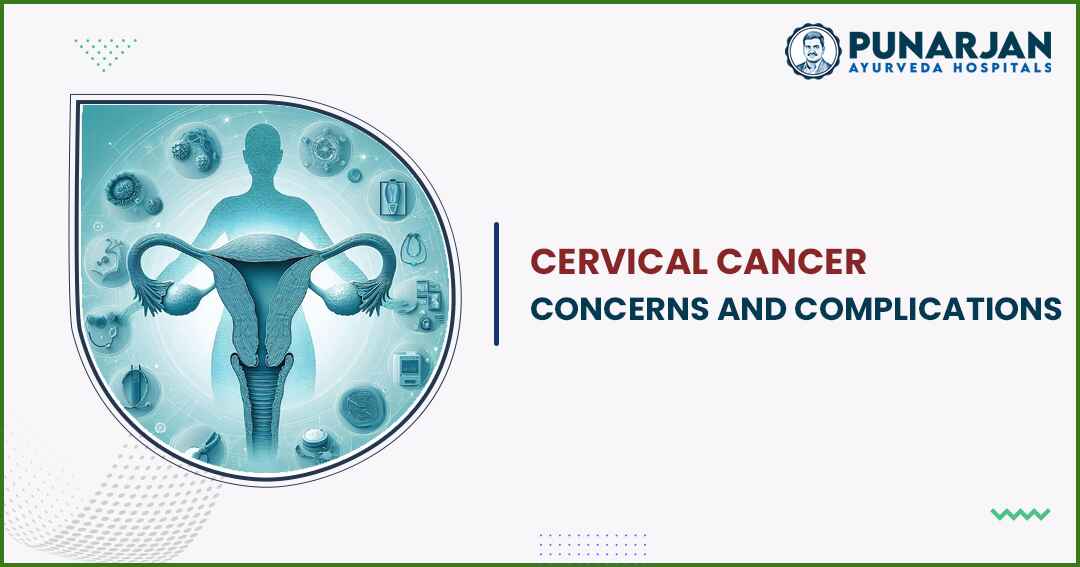Cervical cancer is a significant health concern, impacting millions of women worldwide. The good news is that early detection and appropriate treatment can greatly improve the prognosis. However, it’s essential to be aware of the concerns and potential complications that can arise during and after treatment. We will discuss these issues, shedding light on common concerns, fertility and reproductive issues, pelvic health, and more.
Common Cervical Treatment-Related Concerns
When facing cervical cancer, you may have questions and concerns about the various treatments available and their potential side effects. Here’s what you need to know:>
Surgery
Post-Surgery Recovery
Recovery after cervical cancer surgery can be challenging, with discomfort, pain, and fatigue. However, following your healthcare provider’s post-operative instructions is crucial.
Bladder and Bowel Function
Depending on the type of surgery, you may experience temporary changes in bladder or bowel function. These usually improve over time but should be discussed with your healthcare team.
Scar Tissue (Adhesions)
Surgical scars can lead to adhesions, which are bands of tissue that may cause pain or discomfort. Physical therapy and gentle exercises can help manage this issue.
Radiation Therapy
Fatigue
Radiation therapy often causes fatigue, which can be long-lasting. Getting plenty of rest and communicating with your medical team about this symptom is essential.
Skin Changes
Skin in the treated area may become red, irritated, or sensitive. Proper skincare and following your healthcare provider’s advice can help manage these side effects.
Vaginal Dryness
Radiation can affect vaginal moisture, leading to discomfort during sexual activity. Discuss this concern with your healthcare provider to explore options for relief.
Chemotherapy
Nausea and Vomiting
Chemotherapy can cause nausea and vomiting, but these side effects can be effectively managed with medication.
Hair Loss
Some chemotherapy drugs can lead to hair loss. Preparing for this change by exploring wig options or head coverings can help you feel more comfortable during treatment.
Fatigue
Chemotherapy can also cause fatigue. Rest and a balanced diet are crucial during this time.
Fertility and Reproductive Concerns
For many women, fertility and the ability to have children are vital aspects of life. Cervical cancer and its treatments can impact these aspirations. Here are some key considerations:
Infertility
Depending on the stage of cervical cancer and the treatment chosen, fertility may be compromised. Discuss fertility-sparing options with your healthcare provider before starting treatment.
Egg Freezing
Sometimes, egg freezing before treatment can preserve fertility, offering hope for future family planning. Adoption: Adopting can be a fulfilling way to grow your family if fertility is impaired.
Emotional Support
Dealing with fertility concerns can be emotionally taxing. Seek support from professionals, friends, or support groups to navigate this challenging journey.
Pelvic Health and Functionality
Cervical cancer and its treatments can affect pelvic health and functionality. It’s essential to stay informed and proactive about managing these issues:
Bladder and Bowel Problems
Changes in bladder and bowel function can occur due to surgery or radiation therapy. Pelvic floor exercises and dietary adjustments can help mitigate these problems.
Pelvic Pain
Persistent pelvic pain may develop due to surgery or other treatment modalities. Consult your healthcare team for pain management strategies.
Vaginal Changes
Radiation therapy may lead to vaginal narrowing and dryness. Vaginal dilators, moisturizers, and regular sexual activity can help maintain vaginal health.
Pelvic Floor Therapy
Physical therapy focused on the pelvic floor can improve pelvic health, alleviate pain, and enhance sexual function.
Lymphedema and Swelling
Lymphedema is a swelling condition that can occur when lymphatic drainage is impaired. It is a less common complication of cervical cancer treatment but one worth knowing about:
Signs of Lymphedema
Look out for signs of lymphedema, such as swelling, heaviness, or discomfort in the legs or pelvic area. Promptly report any unusual symptoms to your healthcare provider.
Risk Reduction
To reduce the risk of lymphedema, maintain a healthy weight, exercise regularly, and avoid injury or infection in the affected area.
Management
Lymphedema can be managed with compression garments, manual lymphatic drainage, and other therapies. Early intervention is essential for better outcomes.
Sexual Health and Intimacy
Maintaining a fulfilling sexual life after cervical cancer treatment is a valid concern. Address these aspects for a healthier intimate relationship:
Vaginal Dryness
As mentioned earlier, radiation therapy can lead to vaginal dryness. Lubricants and moisturizers can help alleviate discomfort during sexual activity.
Pain During Sex
Pelvic pain or discomfort during sex is not uncommon after treatment. Communicate openly with your partner and consider alternative sexual activities that may be more comfortable.
Emotional Connection
Sexual intimacy is not just about physical function; it’s about emotional connection too. Seek support from a therapist or counselor to maintain a healthy emotional bond with your partner.
Late Effects and Long-Term Complications
Cervical cancer survivors should be aware of the potential long-term complications:
Recurrence
Regular follow-up appointments are crucial to detect and treat any potential recurrence of cervical cancer promptly.
Secondary Cancers
Some cancer treatments may increase the risk of developing other cancers in the future. Discuss these risks with your healthcare provider.
Emotional Well-being
Dealing with cancer and its complications can affect your mental health. Consider therapy or support groups to help you cope with anxiety or depression.
Healthy Lifestyle
Adhering to a healthy lifestyle with a balanced diet, regular exercise, and avoiding smoking and excessive alcohol consumption can significantly reduce the risk of complications.
Get All Your Queries Answered: Punarjan Ayurveda
If you have further questions or concerns about cervical cancer, its complications, and treatment options, Punarjan Ayurveda is here to provide expert guidance and support. We specialize in Ayurvedic treatments that can complement conventional cancer care and help manage various complications and concerns associated with cervical cancer.
Disclaimer:
This information on this article is not intended to be a substitute for professional medical advice, diagnosis, treatment, or standard medicines. All content on this site contained through this Website is for general information purposes only.






